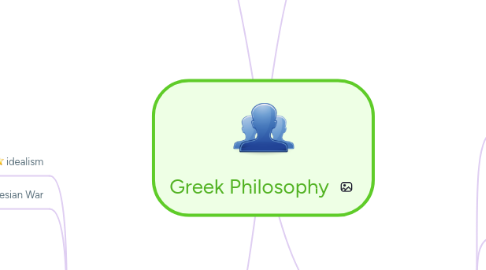
1. Plato
1.1. idealism
1.2. time: Peloponnesian War
1.2.1. execution of Socrates
1.3. character
1.3.1. low profile
1.3.1.1. low opinion in democracy
1.3.1.2. if he discuss politics, he did in syracuse
1.3.1.2.1. syracuse - governed by tyranny
1.3.1.2.2. hope to educate tyrant's heir but it didn't work out
1.3.1.3. found a school, the Academy, in Athenian suburb
1.3.2. distrust senses
1.3.3. belief
1.3.3.1. truth exists but only comes by training of the mind to overcome commonsense evidence
1.3.3.1.1. geometry as model
1.3.3.1.2. ancient encyclopedia.eu said that for Plato there is only one truth
1.3.3.2. purity
1.3.3.2.1. absolute good and evil
1.4. ideal society
1.4.1. small polis which self-sufficient and closed to outside corruption like sparta
1.4.2. philosopher as kings
1.4.2.1. who are unselfish
1.4.2.2. only philosopher can be perfect
1.4.3. society class
1.4.3.1. philosopher
1.4.3.2. soldier
1.4.3.3. farmer
1.4.3.4. admission into each class is based on merit
1.5. writing
1.5.1. dialogue or play
2. Aristotle
2.1. practical
2.2. Plato's student in the Academy
2.3. from Macedonia
2.4. found a school, Lyceum
2.5. writing
2.5.1. dialogue
2.5.1.1. didn't survive
2.5.2. treatise
2.5.2.1. more straightforward
2.6. character
2.6.1. thirst for knowledge
2.7. method
2.7.1. observation
2.7.2. classification
2.7.3. systemization
2.8. belief
2.8.1. absolute of good and evil
2.8.1.1. like plato
2.8.2. senses are guidance
2.8.2.1. unlike plato
2.8.3. male dominance
2.8.3.1. women are weaker
2.8.3.1.1. condemned Sparta that accorded power to women
2.8.3.1.2. but support women education becaz women is important in family
2.8.4. change
2.8.4.1. teleological
2.8.4.1.1. each organism grow or changes - for a real purpose
2.8.4.1.2. the entire cosmo is teleological
2.8.5. object's aerie
2.8.5.1. fulfillment of its inherent function in the cosmos
2.8.6. only philosopher could achieve the arete l
2.8.6.1. like plato
2.8.7. politics
2.8.7.1. philosopher - not king
2.8.7.2. government
2.8.7.2.1. poor vote in assembly
2.8.7.2.2. rich - high office who hv been trained philosophers
3. Sophists
3.1. teacher to teach politicians the art of speaking
3.1.1. in late 5th bc, political success need oratory
3.1.2. eg Protagoras
3.1.2.1. men is the measure of all things
3.1.3. teach for success
3.1.3.1. not for truth
3.1.4. little respect for the established law
3.1.4.1. thus oligarchs who was trained went against athenian democracy and thing get worse
3.1.5. many ppl influenced by them
3.1.5.1. Democritus
3.1.5.1.1. found atom
3.1.5.1.2. shared sophistic notion
3.1.5.2. Hippocrates
3.1.5.2.1. physicians
3.1.5.2.2. sophistic notion
4. Socrates
4.1. unlike sophists
4.1.1. critics sophists
4.1.2. no fee charged for students
4.2. character:
4.2.1. awareness of ignorance
4.2.2. loyal to Athen
4.2.2.1. therefore no revolution or ...
4.2.2.2. though he doubt on democracy which he believed to be inefficient
4.2.3. politic
4.2.3.1. preferred to be ruled by wise elite
4.3. enemies
4.3.1. as he stung the pride of ashen's leader by demonstrating their pride
4.3.2. he got executed in 399 BC
4.3.2.1. athenian public recognize it as one of the history great miscarriage of justice
4.4. belief
4.4.1. purpose of life
4.4.1.1. pursue arete
4.4.1.1.1. arete: studying the truth - the knowledge
4.5. writing
4.5.1. none
4.5.1.1. as he believe truth can only be found by discussion among ppl
4.6. socratic method
4.6.1. a form of cooperative argumentative dialogue between individuals, based on asking and answering questions to stimulate critical thinking and to draw out ideas and underlying presumptions. by wikipedia
